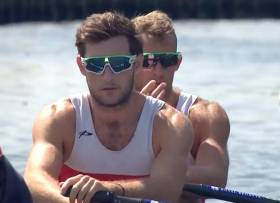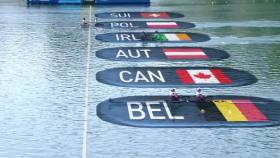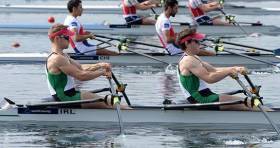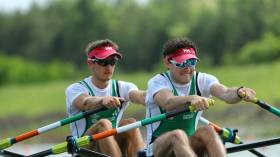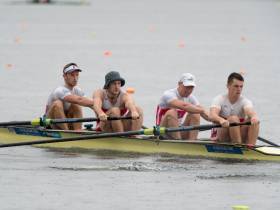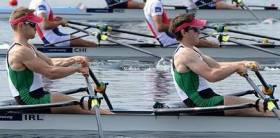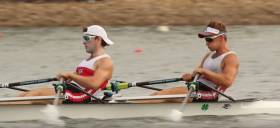Displaying items by tag: Gary O'Donovan
#Rowing: Paul O’Donovan and Gary O’Donovan won their first race at Henley Royal Regatta with plenty to spare. The Skibbereen double scull sprinted away from Leander’s Stephen Cox and Tiernan Oliver at the start and left them well behind for the rest of the contest. The winning marging was a quarter length shy of five lengths.
Henley Royal Regatta, Day Three (Irish interest; selected results)
Thames Cup (Eights, club): Montclair Mounties, United States bt Cork Boat Club ¾l .
Prince Albert (Fours, coxed; Student): Columbia University, US bt NUIG 1¾ l.
Double Sculls (Open): G O’Donovan, P O’Donovan bt S Cox, T Oliver 4¾ l.
Heats No Problem for O'Donovan Brothers at Cork Regatta
#Rowing: Paul O’Donovan won his heat of the single sculls in an excellent time of seven minutes 7.8 seconds in glorious sunshine at Cork Regatta today. The Skibbereen man had 2.7 seconds to spare over heavyweight oarsman Ronan Byrne of UCC. Gary O’Donovan wont the previous heat in the third-fastest time, with Sam McKeown not far behind, setting the fourth fastest time overall.
Lisa Dilleen of Cork Boat Club was the fastest women’s single sculler in the heats, with Denise Walsh of Skibbereen second.
#Rowing: Ireland’s Paul O’Donovan and Gary O’Donovan took a bronze medal at the World Cup Regatta in Belgrade this morning. The A Final of the lightweight double was tight and had an exciting finish. Ireland started well, but Poland took the lead and held it through to the 1500 metres mark, with Ireland, Austria and Belgium exerting pressure. The Irish moved in the final 500 metres – but so did Poland. Jerzy Kowalski and Milosz Jankowski drove for the line and won. Belgium caught the Irish and passed them on the line. The took the silver by one hundredth of a second.
World Cup Regatta, Belgrade, Day Three (Irish interest)
Men
Lightweight Double Sculls – A Final: 1 Poland 6:13.04, 2 Belgium 6:14.09, 3 (G O’Donovan, P O’Donovan) 6:14.10; 4 Canada Two 6:17.27, 5 Austria 6:17.32, 6 Switzerland Two 6:23.87.
#Rowing: Paul O’Donovan and Gary O’Donovan brought Ireland a second A Final place at the World Cup Regatta in Belgrade as they won their semi-final of the lightweight double sculls. The Skibbereen men moved through the early leaders to lead by halfway and they held the lead to the finish, though Poland closed to within a second on the line. Belgium held off the Czech Republic to take third.
Denise Walsh and Margaret Cremen finished sixth in the second semi-final of the women’s lightweight double. The United States won the race from Switzerland and the Netherlands. The Ireland crew found it hard to make an impression and held sixth from early on.
Sanita Puspure had taken her place in the A Final of the women’s single sculls with second place in her semi-final.
World Cup Regatta, Belgrade, Day Two (Irish interest)
Men
Pair – C Final (Places 13 to 18): 1 Hungary 6:55.35, 2 Greece 6:57.73, 3 Ireland (M O’Donovan, S O’Driscoll) 6:59.0, 4 South Africa 7:00.22.
Lightweight Double Sculls – Semi-Final Two (Three to A Final; rest to B Final): 1 Ireland (G O’Donovan, P O’Donovan) 6:22.28, 2 Poland 6:22.87, 3 Belgium 6:24.21.
Women
Pair – Semi-Final Two (Three to A Final; rest to B Final): 1 Spain 7:35.18, 2 Denmark 7:35.77, 3 Britain Two 7:39.35; 4 Ireland (A Keogh, E Hegarty) 7:42.60.
Double Sculls – Semi-Final (Three to A Final; rest to B Final): Netherlands 7:16.27, 2 Belarus One 7:18.73, 3 Belarus Two 7:23.46; 4 Ireland (A Crowley, M Dukarska) 7:25.60.
Lightweight Double Sculls - Semi-Final (Three to A Final; rest to B Final): 1 United States One 7:03.73, 2 Switzerland 7:05.94, 3 Netherlands 7:06.04; 6 Ireland (M Cremen, D Walsh) 7:24.87.
Single Sculls – Semi-Final (Three to A Final; rest to B Final): 1 Denmark (F Erichsen) 7:24.76, 2 Ireland (S Puspure) 7:25.43, 3 Britain (V Thornley) 7:25.78.
#Rowing: Paul O’Donovan and Gary O’Donovan secured a semi-final place with second in their heat of the lightweight double sculls at the World Cup regatta in Belgrade. Patrick Keane and Maxwell Lattimer, the Canada Two crew, won the race. They fought off Portugal and then kept Ireland at bay, winning by 1.6 seconds.
World Cup Regatta, Belgrade (Irish interest)
Men
Pair – Heat Four (Winner to A/B Semi-Finals; rest to repechage): 1 Czech Republic 6:41.22; 2 Spain 6:48.03, 3 China One 6:51.79, 4 Ireland (M O’Donovan, S O’Driscoll) 6:51.91.
Lightweight Double Sculls – Heat Three (First two to A/B Semi-Finals; rest to repechage): 1 Canada Two 6:32.69, 2 Ireland (G O’Donovan, P O’Donovan) 6:34.29.
Women
Pair – Heat One (First Three to A/B Semi-Finals; rest to repechage): 1 Britain One 7:19.05, 2 Britain Two 7:22.92, 3 Ireland (A Keogh, E Hegarty) 7:23.77.
Double Sculls – Heat Three (First Three to A/B Semi-Finals; rest to repechage): 1 Netherlands 7:10.90, 2 China One 7:16.89, 3 Ireland (A Crowley, M Dukarska) 7:20.40.
Lightweight Double Sculls – Heat One (First two to A/B Semi-Finals; rest to repechage): 1 Britain One 7:26.96, 2 United States One 7:28.40; 5 Ireland (M Cremen, D Walsh) 7:50.34.
Single Sculls – Heat One (First Two to A/B Semi-Finals; rest to repechage): 1 Ireland (S Puspure) 7:50.48, 2 Ukraine (D Dymchenko) 7:59.30.
O'Donovans Burn Off Rivals at Ireland Rowing Trials
#Rowing: Paul O’Donovan and Gary O’Donovan produced the best performance of the first Saturday session of the Ireland trials. The lightweight double beat their Skibbereen under-23 rivals Jake and Fintan McCarthy by 8.4 seconds and a heavyweight double of Ronan Byrne (UCC) and Philip Doyle (Queen’s) by 3.9 seconds.
The heavyweight pair of Shane O’Driscoll and Mark O’Donovan also put their challengers firmly behind them. They raced at a high rate in the good conditions and beat Patrick Boomer and Andy Harrington by 6.6 seconds.
Three senior women’s crews performed well. Single sculler Sanita Puspure and the heavyweight and lightweight doubles of Monika Dukarska and Aileen Crowley and Denise Walsh and Margaret Cremen all looked on form as the selectors decide on which crews to send to the World Cup Regatta in Belgrade.
In the junior trials, Annie O’Donoghue and Ciara Moynihan of Workmen’s won a fine doubles race. Aoibhinn Keating of Skibbereen and Ciara Browne of Workmen’s were their closest rivals, but Mollie Curry of Coleraine GS and Eimear Crowley of Kenmare contended at the finish and were just 1.4 seconds off the winners.
Skibbereen Rowing Regatta Cancelled
#Rowing: Skibbereen Regatta, set for this Saturday and Sunday, April 14th and 15th, at the National Rowing Centre, has been cancelled. The weather forecast, which orginally put the Sunday of the event in doubt, worsened. Saturday evening was set to feature a south east wind which would have made parts of the course unrowable. The organisers decided to abandon both days. The event featured a record entry for a domestic regatta.
Skibbereen Sunday in Doubt on Bumper Weekend for Irish Rowers
#Rowing: This weekend is one of the busiest of the year for Irish rowers. At the National Rowing Centre in Cork the University Championships of Ireland will be held on Friday, April 13th, and Skibbereen Grand League Regatta is scheduled for Saturday and Sunday, April 14th and 15th. This event has its biggest-ever entry, but a very bad weather forecast for the Sunday has put competition on that day in doubt. Three Ireland women’s crews will also compete in an international regatta in Italy, the Memorial Paolo d’Aloja in Piediluco.
World champions Mark O’Donovan and Shane O’Driscoll and Olympic medallists Paul O’Donovan and Gary O’Donovan arrived home earlier this week after three months training and competition in New Zealand and Australia. The four Skibbereen men intend to compete in their home club’s regatta.
On Friday, over 140 crews from 10 different universities and colleges around the country will compete in the University Championships. The event is set to start at 9:30 am with a straight final of the senior men’s fours and races will run throughout the day. The final contest, the men’s senior eights is scheduled for 4:20 pm.
In Italy, two-time Olympian Sanita Puspure will compete in the heavyweight women’s single sculls in Piediluco. Aileen Crowley and Monika Dukarska will race in a double scull, while Emily Hegarty and Aifric Keogh are set to compete in a pair.
Skibbereen Scullers Put Up Medal Challenge in Sydney
#Rowing: Paul O’Donovan and Gary O’Donovan came fifth in the Open Double Sculls at the Sydney International Rowing Regatta. The Skibbereen crew were well in contention and finished just under three seconds short of a medal place in the eight-crew contest. The Sydney/Adelaide crew of David Watts and Alexander Hill won gold. Hill had taken gold on Thursday in the men’s Open Single Sculls. Don McLachlan, the former Ireland coach, was involved in coaching both the second- and third-placed crews.
Sydney International Rowing Regatta, Day Five (Friday; Irish interest)
Men
Open Double Sculls – A Final: 1 Adelaide/Sydney (A Hill, D Watts) 6:26.08, 2 UTS/Sydney 6:28.34, 3 Sydney University-NTC 6:30.45; 5 Skibbereen (G O’Donovan, P O’Donovan) 6:33.28.
Fast Win in Sydney Heat for O'Donovan Brothers
#Rowing: Paul O’Donovan and Gary O’Donovan won their heat of the Open double sculls at the Sydney International Rowing Regatta in Australia. The Skibbereen duo had the fastest time of the two heats. They will compete in the A Final on Friday. The brothers are featured in the video below, scroll to 26 seconds in the timeline.
Mark O’ Donovan and Shane O’Driscoll took sixth place in their heat of the Open pair. They must compete in a repechage in an attempt to qualify for the A Final.
Sydney International Rowing Regatta, Day Two (Tuesday; Irish interest)
Men
Open Pair – Heat One (First two crews to A Final; rest to Repechages): 6 Skibbereen (M O’Donovan, S O’Driscoll) 7:03.94.
Open Double Sculls – Heat Two (First two crews to A Final; rest to Repechages): 1 Skibbereen (G O’Donovan, P O’Donovan) 6:24.19.


























